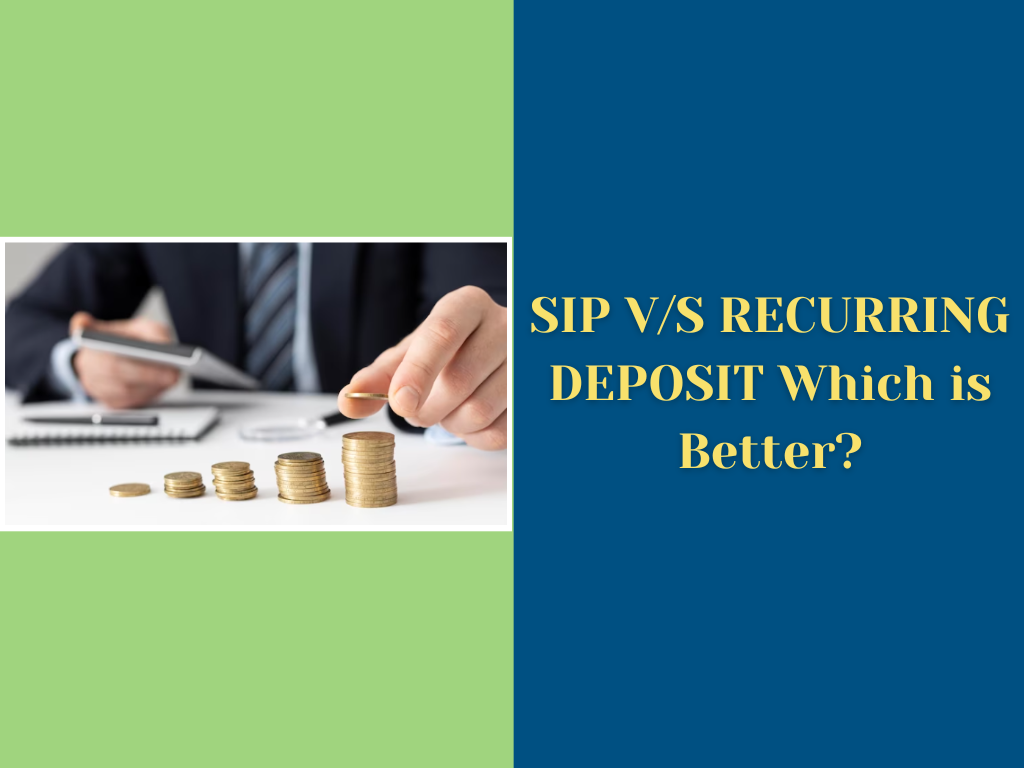SIP V/S RECURRING DEPOSIT Which is better ?
SIP (Systematic Investment Plan) and Recurring Deposit (RD) are both investment options, but they differ significantly in terms of features, risk, return potential, and tax treatment. Here's a comparison between SIP and RD:
Investment Type:
SIP: SIP is a method of investing in mutual funds. When you invest in SIP, your money is pooled with that of other investors and invested in a diversified portfolio of stocks, bonds, or other securities based on the mutual fund's objective.
RD: Recurring Deposit is a type of fixed-term deposit offered by banks. It allows you to deposit a fixed amount regularly into the RD account, usually on a monthly basis, for a predetermined period.
Returns:
SIP: The returns on SIP investments are linked to the performance of the mutual fund and the underlying securities in which the fund invests. Mutual funds can potentially offer higher returns than other traditional investment options, but they are subject to market risks.
RD: The returns on RD are relatively fixed and predetermined, similar to traditional fixed deposits. The interest rate is fixed at the time of opening the RD account, and the interest earned is generally lower than the potential returns from equity-based mutual funds.
Risk:
SIP: SIP investments are subject to market risks. The value of mutual funds can fluctuate based on the performance of the financial markets. While they offer the potential for higher returns, there is also a possibility of loss.
RD: Recurring deposits are considered low-risk investments since they are offered by banks and are not subject to market volatility. The principal amount, along with interest, is generally assured at the end of the tenure.
Liquidity:
SIP: Mutual funds typically offer higher liquidity compared to RD. You can redeem your mutual fund units at any time (subject to any exit load) and receive the current value of your investment.
RD: Recurring deposits have a fixed tenure, and premature withdrawals may result in a penalty or reduced interest rates.
Tax Treatment:
SIP: The tax treatment of SIP investments depends on the type of mutual fund and the holding period. Equity mutual funds held for more than one year qualify for long-term capital gains tax with indexation benefits, while gains from debt mutual funds and short-term equity funds are taxed at different rates.
RD: The interest earned from a recurring deposit is fully taxable as per your income tax slab in the year it is earned.
Investment Horizon:
SIP: SIPs are generally suitable for long-term investment horizons due to the potential for higher returns through compounding.
RD: RDs are typically short to medium-term investments with fixed tenures ranging from a few months to a few years.
Ultimately, the choice between SIP and RD depends on your risk tolerance, investment goals, and time horizon. If you are looking for potential higher returns and are comfortable with market risks, SIP in mutual funds could be a better option. On the other hand, if you prefer low-risk investments with predictable returns, an RD might be more suitable for short-term goals. As always, it's recommended to seek advice from a financial advisor to align your investments with your specific financial objectives.


